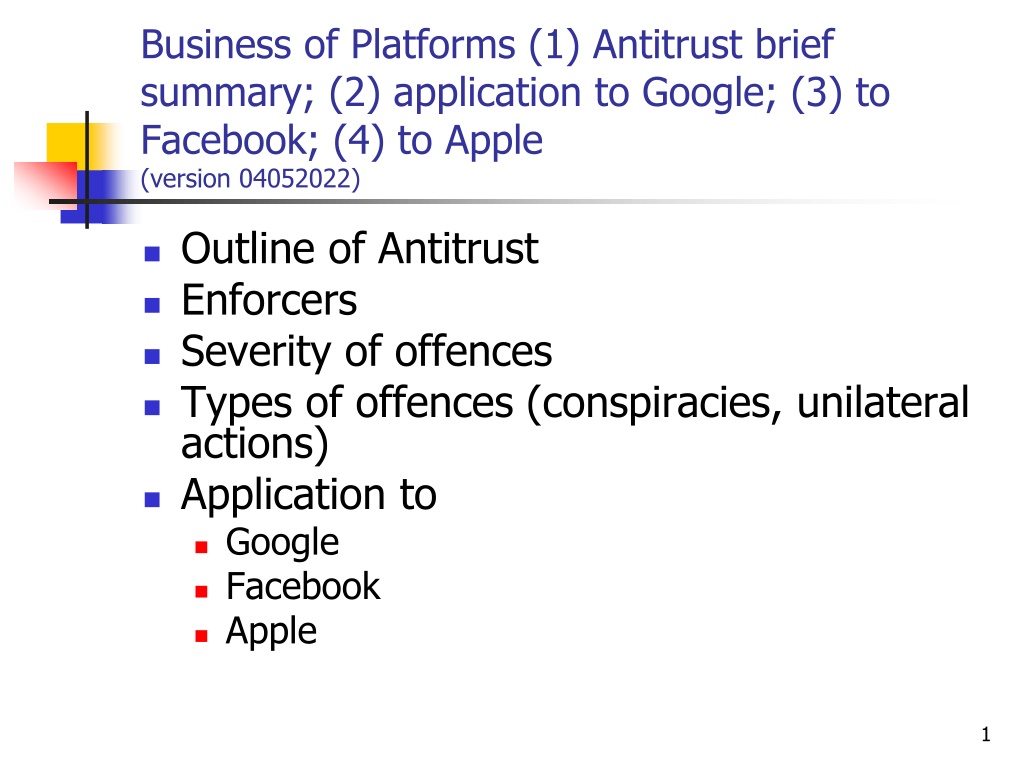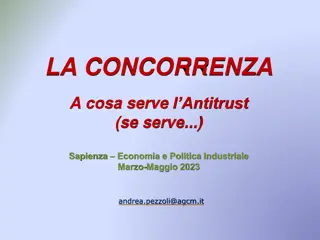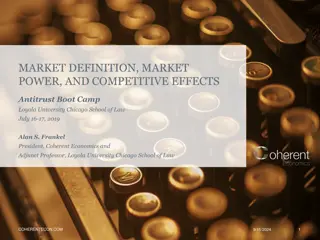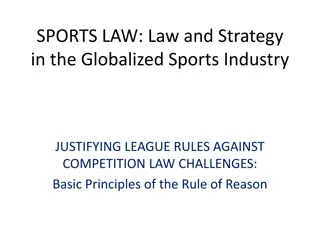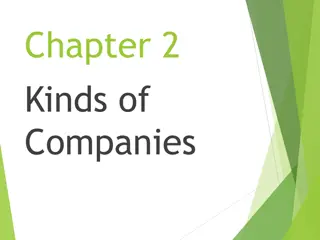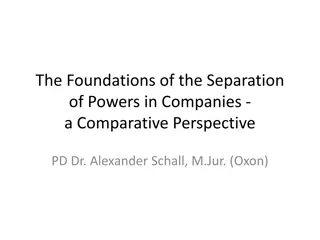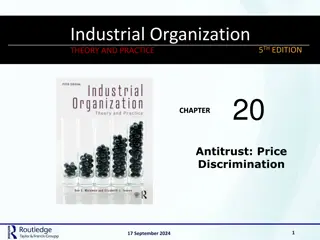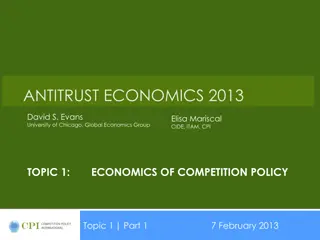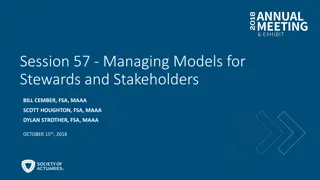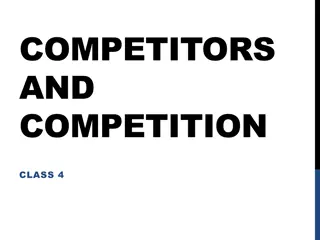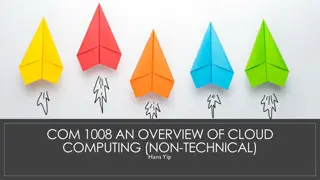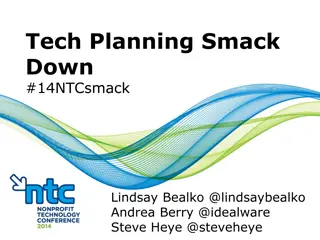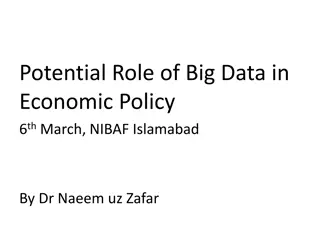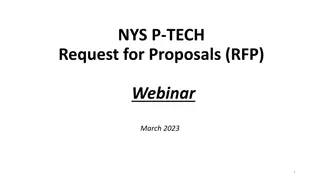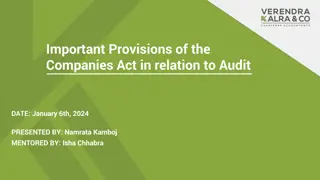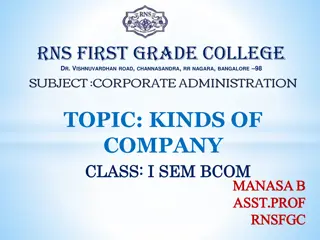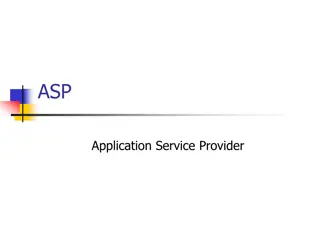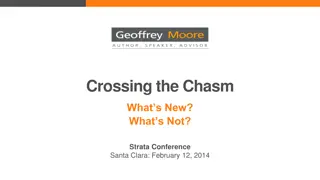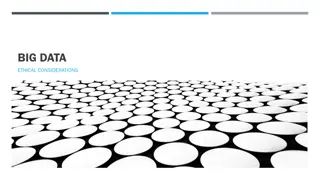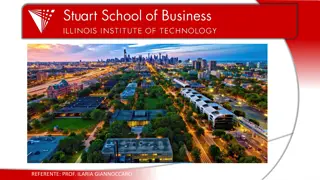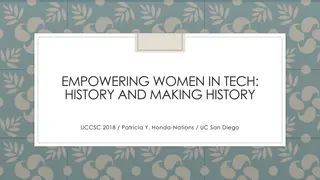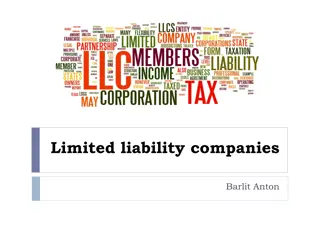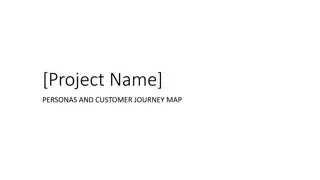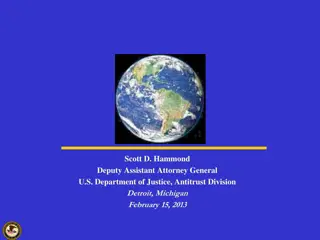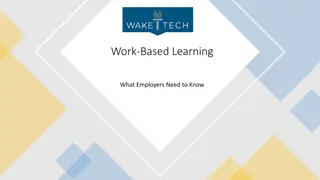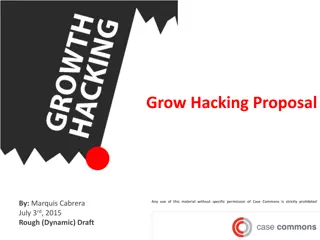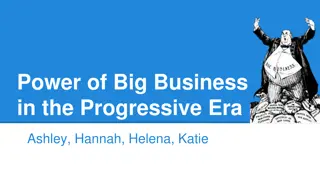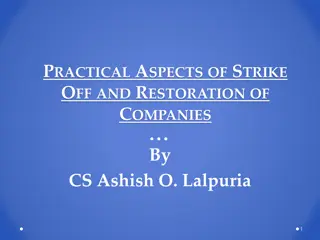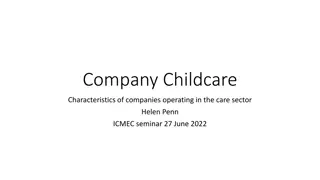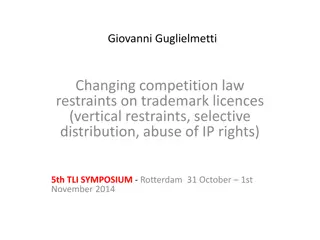Antitrust Overview and Application to Big Tech Companies
Antitrust laws are enforced by agencies like the DoJ, FTC, and European Commission to prevent anti-competitive practices. Violations include conspiracies to fix prices or reduce output and unilateral actions by a single firm. Cartels and conspiracies are illegal, and companies can face severe penalties. The Air Cargo cartel case is an example where airlines colluded to increase prices, leading to fines and consumer settlements. This overview applies to tech giants like Google, Facebook, and Apple, highlighting the importance of fair competition in the digital market.
Download Presentation

Please find below an Image/Link to download the presentation.
The content on the website is provided AS IS for your information and personal use only. It may not be sold, licensed, or shared on other websites without obtaining consent from the author. Download presentation by click this link. If you encounter any issues during the download, it is possible that the publisher has removed the file from their server.
E N D
Presentation Transcript
Business of Platforms (1) Antitrust brief summary; (2) application to Google; (3) to Facebook; (4) to Apple (version 04052022) Outline of Antitrust Enforcers Severity of offences Types of offences (conspiracies, unilateral actions) Application to Google Facebook Apple 1
Summary of antitrust law Enforcers: In US, Dept. of Justice (DoJ), Federal Trade Commission (FTC); European Commission in EU; Japan, Korea, Brazil, China, others Severe punishments: In the US: felony, prison, fines Ability of harmed parties (for example, consumers) to collect triple damages in US Broadly, two categories of antitrust violations: (1) conspiracies among companies to increase output prices (and/or reduce output) or reduce input prices (2) single-firm (unilateral) actions
Conspiracies Conspiracies among companies to charge high prices ( fix prices ), or to cut production, or to cut production capacity are illegal even if the companies in the conspiracy have collectively a small market share and their actions cannot have a significant impact on price Cartels and conspiracies among producers are illegal Cartels do not have to be of all firms US companies cannot participate in cartels, but can benefit from the existence of cartels Exxon benefits from OPEC s actions to increase price of oil
Conspiracies cont. A conspiracy can be among producers to increase output price or to decrease the price of an input Also, conspiracies in bidding procurement auctions where conspirators decide in advance who gets the contract and at what price and then bid in a coordinated fashion 4
Conspiracy example: Air Cargo cartel About 30 international airlines conspired for 7 years to increase the price of international air cargo transportation They imposed the same surcharge per kilo on all shipments, irrespective of distance Surcharge varied over time, following the price of kerosene fuel Surcharge was calculated weekly by Lufthansa and published on its web site! At the beginning of the cartel, through IATA (the airlines association), the airlines asked DOJ for an exemption from US antitrust law on the surcharges Denied exemption; but airlines proceeded with conspiracy anyway (!) DOJ sued and imposed $2 billion fines (highest ever) and 6 prison sentences US consumers (that is, shippers) collectively sued the airlines (so called, class action ); similar Canada case Consumers recovered $1.2 billion in settlements in the US case (I served as an economic expert in the US and Canadian lawsuits) Other big cartels cases: Vitamins, LCD screens, CRT screens, LIBOR, optical drives; major airlines agreeing to reduce capacity (planes, seats) When introducing the iPad, Apple conspired with 5 publishers to increase the price of eBooks sold by Amazon; was tried and found liable
Single-firm illegal actions Monopolization (creating a monopoly) or preservation or enhancement of (existing) monopoly using anti-competitive means Attempt to monopolize a market using illegal means Major exception if monopoly was achieved by business acumen, historical accident, or luck Just having a monopoly is not illegal! Price discrimination, tying, and bundling are illegal only if they reduce competition and harm consumers
Single-firm illegal actions cont. Law is much more lenient on single-firm actions than on cartels For cartels, there is no need to examine economic effects, while this is necessary for unilateral actions Companies with large market share (over 60%) have additional obligations under antitrust law that small market share firms do not have 7
Predation is illegal Predation: company A sells below cost until rival B goes out of business in period 1, and in period 2 company A increase prices to monopoly level to recoup losses of period 1 Issues: Requires company A to have a monopoly in second period to recover the losses of the first period No guarantee that a new entrant may not enter in second period So, killing company B is not enough to show predation
Predation example Matsushita displaced RCA in TV manufacturing RCA sued; it reached the Supreme Court RCA could not prove that in the second period Matsushita recovered its first period losses RCA lost the suit 9
Questions/review of antitrust Q1. 5 companies each have 1% market share in the bottled water market. They agree to limit production. Are they liable? Do economic effects matter for conspiracies? Q2. Facing fuel increases, 30 major airlines agree to add the same surcharge per pound to any cargo transportation. Lufthansa publishes the surcharge of the week at its website. Are they liable? Are cost increases an excuse for conspiracies? 10
More antitrust questions Q3. HP invents a new printer that uses cartridges that it also sells. Company X also sells compatible cartridges. HP takes actions to drive X out of business. Is HP liable? Key question: did consumers lose? 11
Cont. Q4. Microsoft has 97% market share in the operating systems market for PCs. At the advent of the Internet, MSFT produces a browser (IE) that it bundles with Windows and distributes for free. It manages to kill Netscape, the first commercial browser. Is MSFT liable? DOJ alleged and the court found that Netscape, together with the Java programming language, could become a PC operating system threatening Windows. Therefore MSFT killing Netscape was MSFT s attempt to preserve its monopoly Court found MSFT liable and ordered its breakup Appeals court revered the breakup, but continuous antitrust scrutiny harmed MSFT What if MSFT had only 25% market share in the OS market for PCs? 12
(2) Antitrust cases against Google United States v. Google, filed 10/20/20 Brought by DOJ and a number of Attorneys General of states Major antitrust suit against Google, similar to the major antitrust suit of DOJ against Microsoft in 1998 DOJ and States have a pretty good chance of winning If DOJ and States win, it can result in severe business restrictions on Google, even a breakup of the company 13
The markets for the Google search and advertising platform Internet search US general search: 85+% market share US desktop: 81% market share US mobile: 95% Chrome, US: 60+% Safari: 16% Microsoft (Edge + IE) 15% Firefox 7% 14
Search advertising Digital advertising US market about $500 billion Google market share about 1/3 (WSJ) Search advertising Google 63+% market share (eMarketer) 15
Allegations (under section 2 of Sherman Act) 1. Monopolization of Internet search by illegally maintaining monopoly 2. Monopolization of search advertising by illegally maintaining monopoly 3. Monopolization of search text advertising by illegally maintaining monopoly 4. Various illegal exclusionary actions to achieve monopolization, including making Google search the default on Android phones 16
What does monopolization mean here? Maintaining and/or enhancing a monopoly through illegal means, such as exclusionary actions and foreclosure agreements 17
Alleged anti-competitive actions Paying Apple ($4bil per year) for Google to be the default search engine Forcing Android OEMs to accept Google search as default Major EU case, Google lost Self-preferencing in search results Another major EU case, Google lost Self-preferencing rules in the ads market Another major EU case, Google lost (AdSense) 18
Two more US states cases against Google Colorado + other states, similar to DOJ s, main allegation monopolization Texas + other states Controlling the ad exchange and both buy and sell side Key allegation: Google dividing by agreement the advertising market with Facebook, a price fixing conspiracy EU filed a similar suit 19
Second DOJ suit against Google 1/24/23 Alleges monopolization of ad tools Similar to Texas suit 20
Allegations Acquiring Competitors: Engaging in a pattern of acquisitions to obtain control over key digital advertising tools used by website publishers to sell advertising space; Forcing Adoption of Google s Tools: Locking in website publishers to its newly-acquired tools by restricting its unique, must-have advertiser demand to its ad exchange, and in turn, conditioning effective real-time access to its ad exchange on the use of its publisher ad server; Distorting Auction Competition: Limiting real-time bidding on publisher inventory to its ad exchange, and impeding rival ad exchanges ability to compete on the same terms as Google s ad exchange; and Auction Manipulation: Manipulating auction mechanics across several of its products to insulate Google from competition, deprive rivals of scale, and halt the rise of rival technologies. 21
EU antitrust suits faced by Google Three EU cases A. EU Shopping case B. EU Android case C. EU Adsense case Why cases in the EU and delay in the US Law is stricter in the EU EU has no problem going after US companies might apply law differently for EU companies Google gave substantial donations and election help to Obama 22
A. Shopping case: Google has admitted violating the rank-based-on-links principle (1) By placing in organic search its own affiliates above other more popular choices Example: Kayak, Google travel affiliate, is placed above Orbitz and Expedia No efficiency justification for this Google s justifications: We want the user not to click again 23
Google has admitted violating the rank-based-on-links principle (2) By demoting aggregators Aggregators put together information on specific searches, e.g., who sells Samsung flat TVs in London Aggregators are in the first search page of Bing and used to be in the first search page of Google Google admits to manually putting aggregators in pages 4-5 of its search 24
Google has admitted violating the rank-based on links principle (3) But aggregators are horizontal rivals to Google, and they are being degraded EU sued Google in 2017 and imposed a fine of $2.9 billion (EU Google Shopping Case ) 25
Facts (1): Android OS & Google Mobile Services (GMS) Android is an off-the-shelf OS that an OEM can freely install on a cell phone or other computing device Google Mobile Services (GMS) is a collection (bundle) of applications, including Google Play, Google Search, and Google Chrome Each service in GMS is complementary to the Android OS There are a number of competing third party apps for each app in GMS Google Play, part of GMS, is an app allowing search, purchase, download and update other apps for the Android OS from the Google apps store 27
Facts (2): Tying and requirement contracts on GMS OEM can choose whether to install GMS If the OEM installs GMS, G s contract obligates OEM to Pre-install all the apps in the GMS bundle therefore, Google Play is contractually tied to other apps in GMS including Google Search, and Chrome Pre-install Google Search as the default for Internet search; pre-install Chrome Not pre-install apps that compete with GMS apps (such as third-party store and third party search ) on any other of its devices running other versions of Android (anti-fragmentation clause) So, an OEM cannot produce some devices/models with GMS on the standardized Google version of Android and some without it on another version of Android 28
EU complaint, 4/2016: Abuse of dominance. Similar earlier complaint in Russia. In EU Google Play dominant in Android OS 90%+ Google Search dominant in Android OS 90%+ GMS dominant in Android OS 90%+ Google Search pre-installed, default, or exclusive search in Android devices G paid some OEMs to exclusively pre-install Google Search under the condition that no third party search will be pre-installed 29
Effects of Googles actions according to complaints G s strategy appears to protect and strengthen Google's dominant position in general Internet search, and adversely affect competition in the market for mobile browsers "Anti-Fragmentation Agreement (not pre-install apps that compete with GMS apps) is not objectively justified 30
Allegations of harm Consumers are harmed because they have less choice Less third-party entry into apps, so innovation is harmed Competition is harmed because of fewer third party apps In EU terms, G abused its dominance In US antitrust terms, the bundling GMS strategy preserved and enhanced the dominance of Google Search 31
Similar to antitrust cases against Microsoft Dominant company (G) forces acceptance of G Search through tying (with G Play) Like Microsoft tying Media Player with OS Dominant company (G) enhances and preserves the monopoly in search through tying Like Microsoft tying IE with OS 32
Googles Defense http://googlepolicyeurope.blogspot.com/2016/0 4/androids-model-of-open-innovation.html Factual (empirically testable) Consumers can easily download another browser, so default does not have a lasting effect This is the only way to make money in this ecosystem Testable, unlikely, and a bad legal defense OEM may not install GMS Irrelevant since the issues arise because of the tying conditions under which GMS is installed 33
Economics of theories of harm Theory 1: Google is better off and search rivals are worse off under tying. Consumers and competition are harmed under tying. Theory 2: Consumers are harmed because tying left them with less choice. True. Theory 3: Innovation was/is harmed since fewer third party apps were/will be developed. Likely true. May be balanced with G s argument of higher G quality in the present regime. The latter is hard to prove. Theory 4: Tying of G Search with (the desirable to the OEM) G Play is used to enhance and preserve the monopoly of G Search. Very plausible. 34
EU fined Google 4.34 billion in July 2018 because Google has required manufacturers to pre-install the Google Search app and browser app (Chrome), as a condition for licensing Google's app store (the Play Store) made payments to certain large manufacturers and mobile network operators on condition that they exclusively pre-installed the Google Search app on their devices has prevented manufacturers wishing to pre- install Google apps from selling even a single smart mobile device running on alternative versions of Android that were not approved by Google (so-called "Android forks") 35
Remedy principle: Licensing Search separately from Play Store Search choice screen for all new devices on which Search is pre-installed Shown at setup of device prompting users to select a search engine from a list of four Chosen search engine is installed on device and become default in home page search widget and Chrome Selection process: Technical eligibility criteria (actual search engine, language) Auction among eligible rivals 36
C. Google Adsense case is about advertising intermediation Some websites have an embedded search function that delivers both search results and search ads Through AdSense for Search, Google provides these search advertisements to owners of publisher websites Google is an intermediary, like an advertising broker, between advertisers and website owners that want to profit from the space around their search results pages AdSense for search works as an online search advertising intermediation platform 37
Google imposed various restrictions on users of Adsense Websites prohibited from placing any search ads from competitors on their search results Google s competitors were prevented from placing their search ads in the most visible and clicked-on parts of the websites search results pages Google could control how attractive, and therefore clicked on, competing search ads could be 38
EU fined Google 1.49 billion for 10 years of abuse of dominance in Adsense 39
(3) Antitrust cases against Facebook FTC v. Facebook Allegations Monopolization of social network market Illegal acquisitions of Whatsapp and Instagram Class action against Facebook Allegations FB used personal data beyond what the users authorized in fine print of default FB collected additional data from users without disclosure to users 40
Privacy issues in Facebook and Google When you login in Facebook or use Chrome or Google Internet search, these companies automatically collect your personal data such as IP address, location, search words, for Google IP address location, what you liked and uploaded for Facebook Analyzed later in the course: Lack of functioning markets for sale of private information 41
(4) Antitrust cases against Apple Epic v. Apple (on appeal) App developers v Apple I was an expert witness in this case App consumers v Apple (at district court) European case, similar but also included allegation of Apple self-preferencing its apps 42
Apple rules created a monopoly in app distribution iPhone apps only available through the Apple app store Apple does not allow any other distribution channel in contrast, there are multiple stores for apps for PCs and Android phones Apple charges a 30% fee to developers to distribute their apps Apple also collects an in-app payment of 30% for post-app-download payments for app enhancements (another shield or life in a video game) Apple doess not allow apps developers to see/contact their customers 43
Epic is a major game software developer Epic wanted its own iPhone app store to mainly distribute games Apple refused Epic sued on monopolization of Apple store Long trial, Apple won on most issues Case is on appeal 44
Apple app developers sued For monopolization by Apple of app distribution Seeking damages for 30% fee Case was settled with Apple giving $100 million to developers Allowing for contact between developers and consumers, not allowed before App consumers case against Apple is continuing 45
Review questions Who are the enforcers of antitrust? Broadly, what types of offenses fall under antitrust law For what types of antitrust violations economic effects matter? For what types they do not? 46
Review questions (cont.) What are the major suits against Google in the US? What is the EU Google Shopping Case? What is the EU Android Case? What is the EU Adsense Case? What are the major antitrust suits against Facebook? Apple? 47
